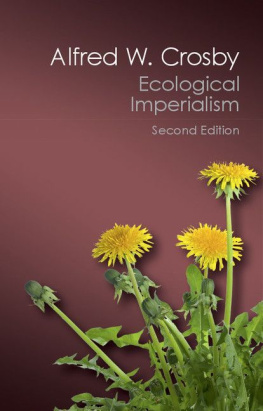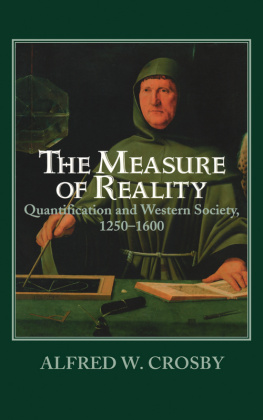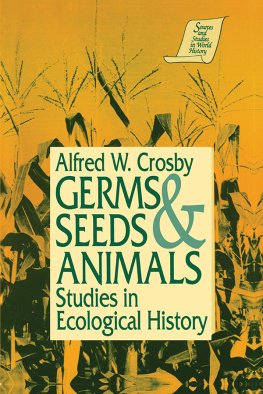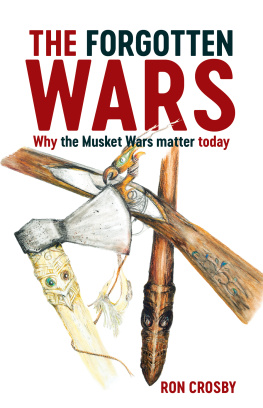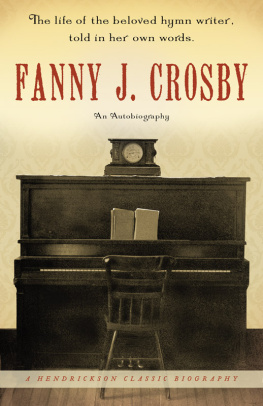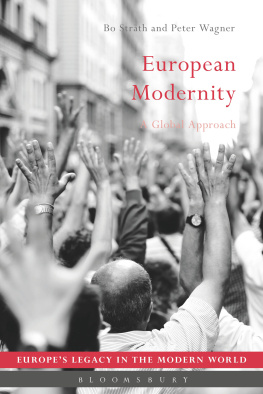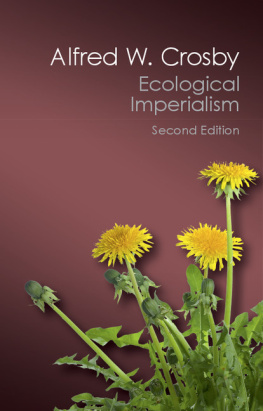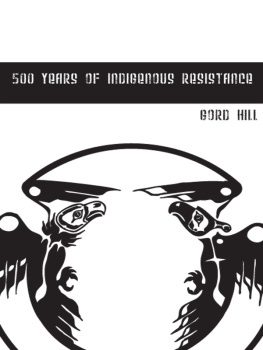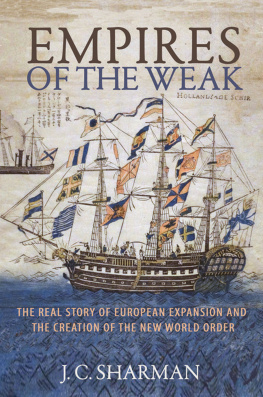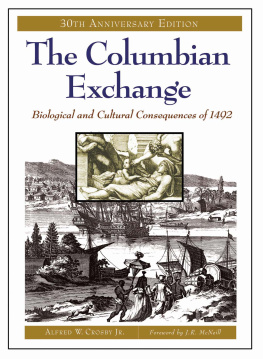ECOLOGICAL IMPERIALISM
People of European descent form the bulk of the population in most of the temperate zones of the world North America, Australia, and New Zealand. The military successes of European imperialism are easy to explain; in many cases they were a matter of firearms against spears. But as Alfred Crosby explains in this highly original and fascinating book, the Europeans displacement and replacement of the native peoples in the temperate zones was more a matter of biology than of military conquest. European organisms had certain decisive advantages over their New World and Australian counterparts. The spread of European disease, flora, and fauna went hand in hand with the growth of population. Consequently, these imperialists became proprietors of the most important agricultural lands in the world.
Now in a new edition with a new preface, Crosby revisits his now classic work and again evaluates the global historial importance of European ecological expansion.
Alfred W. Crosby is Professor Emeritus in American Studies, History, and Geography at the University of Texas at Austin, where he taught for more than 20 years. His previous books include Americas Forgotten Pandemic: The Influenza of 1918 (2nd edition, Cambridge, 2003), Throwing Fire: Projectile Technology through History (Cambridge, 2002), and The Measure of Reality: Quantification and Western Society, 12501600 (Cambridge, 1997). The Measure of Reality was chosen by the Los Angeles Times as one of the 100 most important books of 1997.
Ecological Imperialism
The Biological Expansion of Europe,
9001900
Second Edition

ALFRED W. CROSBY
University of Texas, Austin

CAMBRIDGE UNIVERSITY PRESS
Cambridge, New York, Melbourne, Madrid, Cape Town, Singapore,
So Paulo, Delhi, Dubai, Tokyo
Cambridge University Press
32 Avenue of the Americas, New York, NY 10013-2473, USA
www.cambridge.org
Information on this title: www.cambridge.org/9781107569874
Cambridge University Press 1986, 1993, 2004, 2015
This publication is in copyright. Subject to statutory exception and to the provisions of relevant collective licensing agreements, no reproduction of any part may take place without the written permission of Cambridge University Press.
First published 1986
Canto edition first published 1993
Second edition first published 2004
10th printing 2009
Canto Classics edition 2015
Printed in the United Kingdom by Clays, St Ives plc
A catalog record for this publication is available from the British Library.
ISBN 978-1-107-56987-4 Paperback
Cambridge University Press has no responsibility for the persistence or accuracy of URLs for external or third-party Internet Web sites referred to in this publication and does not guarantee that any content on such Web sites is, or will remain, accurate or appropriate.
TO
JULIA AND JAMES TRAUE
AND THE STAFF OF THE
ALEXANDER TURNBULL LIBRARY.,
WELLINGTON, NEW ZEALAND
THE DISCOVERY OF AMERICA, and that of a passage to the East Indies by the Cape of Good Hope, are the two greatest and most important events recorded in the history of mankind.
Adam Smith, Wealth of Nations (1776)
YET, IF WE WIELD THE SWORD of extermination as we advance, we have no reason to repine the havoc committed.
Charles Lyell, Principles of Geology (1832)
WHEREVER THE EUROPEAN HAD TROD, death seems to pursue the aboriginal. We may look to the wide extent of the Americas, Polynesia, the Cape of Good Hope, and Australia, and we find the same result.
Charles Darwin, The Voyage of the Beagle (1839)
THE DISCOVERY OF AMERICA, the rounding of the Cape opened up fresh ground for the rising bourgeoisie. The East Indian and Chinese markets, the colonization of America, trade with the colonies, the increase in the means of exchange and in commodities generally, gave to commerce, to navigation, to industry an impulse never before known, and thereby, to the revolutionary element in the tottering feudal society, a rapid development.
Karl Marx and Friedrich Engels,
Manifesto of the Communist Party (1848)
Contents
Illustrations
FIGURES
PLATES
Preface to the new edition
EACH GENERATION of scholarly historians has not a universal but at least a common and characteristic way of looking at the past a paradigm, if you will, but that is too ponderous a word for me. Lets call it a scenario.
The scenario a century ago of historians, nearly all of them Europeans or Euro-Americans, about modern imperialism and the industrial revolution was simple. The Europeans had conquered or at least cowed nearly everyone else in the world because the Europeans were the best people in the world. This phenomenon was especially clear in what I call the Neo-Europes the United States, Argentina, Australia, and the like where historians were sure there had never been many indigenous humans and the few survivors were obviously obsolescent.
The industrial revolution had happened first in Europe because everything important started there, as it always had since oh Aristotle. White people were better at machines, administration, and business than other people.
It is easy even fun to criticize the historians of the Victorian era, but they did nothing more contemptible than to draw their conclusions from the evidence they had at hand. Native American populations from the Arctic to Tierra del Fuego, along with those of Australian Aborigines and New Zealand Maori, seemed to be plunging to extinction, while European and Neo-European populations were exploding. Their factories were smoking away in Manchester, the Ruhr, and Pittsburgh. Their railroads spanned North America, there were plans for Trans-Siberian and Cape-to-Cairo equivalents, and the sun couldnt set on the British empire no matter how hard it tried.
Then came the world wars, Gandhi, Lenin and Mao and the Marxist evangelists, innumerable colonial uprisings and the need for a new historical scenario. That scenario rocketed to notoriety in the trying times of the 1960s and soon achieved the status of political correctness. Its theme was that European imperialism had succeeded because of European brutality, superior military technology, and capitalist encroachments. And, oh yes, the industrial revolution was a capitalist scam and an ecological disaster.
We have, guided by this scenario, learned a great deal about our pasts that we had never known or at least consciously acknowledged. I learned that, as one of my T-shirts from Chicagos Field Museum proclaims, Columbus didnt discover America; He invaded it. I learned that more Africans than Europeans came to the New World in the first three post-Columbian centuries. I learned that the industrial revolution was so unhealthy for most of those it supposedly benefited that for several generations they were literally shorter than their peasant ancestors.
And so on and so on. For historians the closing decades of the twentieth century were chilly, and we found that the best way to keep warm was to maintain a furious tirade against our societys and professions founding fathers. (No founding mothers, of course.)
But all scenarios, including this one, have weaknesses and omissions. Yes, European imperialists were egomaniacal about themselves, their religions, and their customs, and they had short tempers and long swords, but why were they so much more successful in the Americas and the Pacific than in Asia or Africa? Why, for instance, had Native American resistance been so ineffective?
Next page
